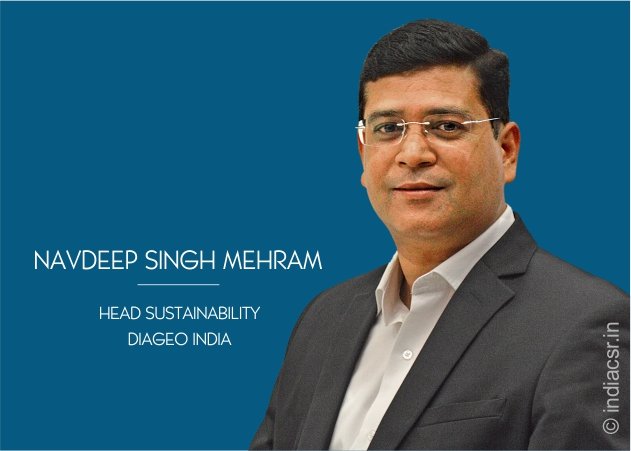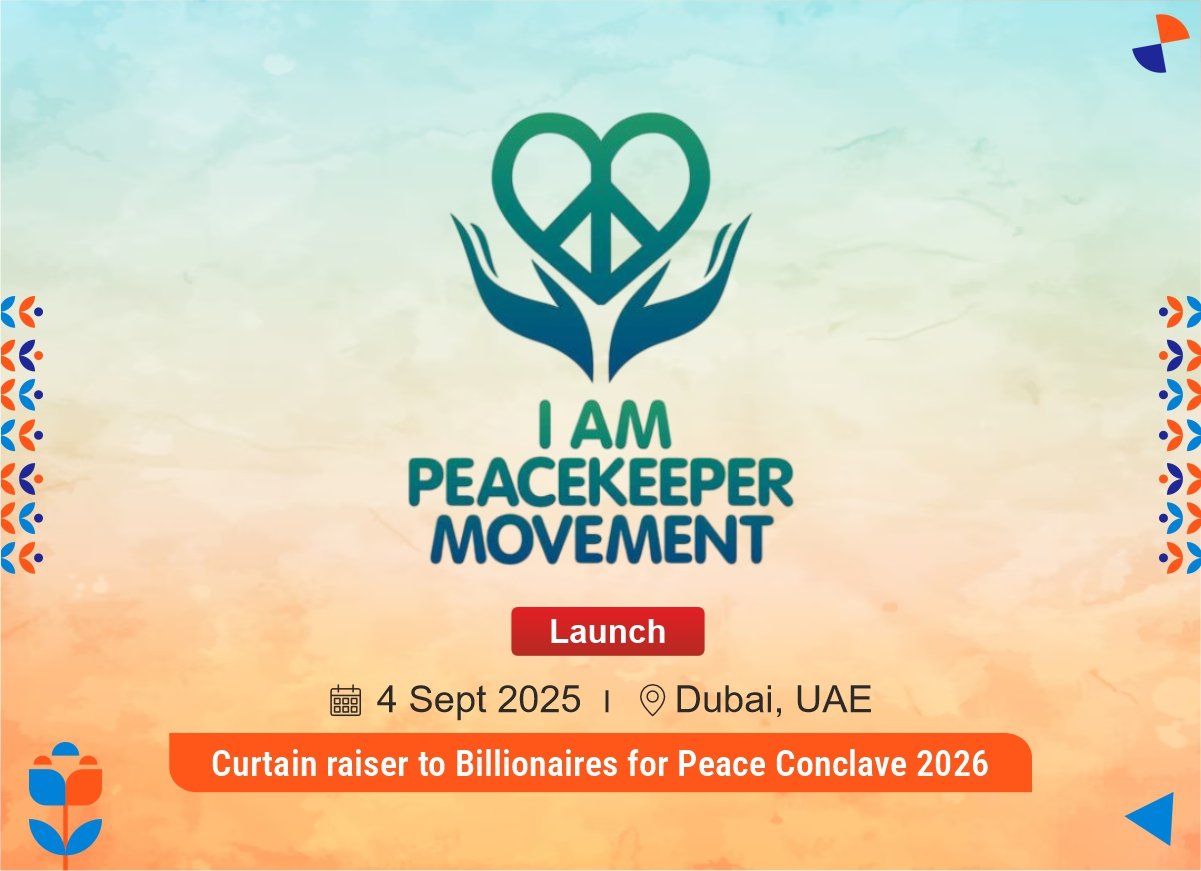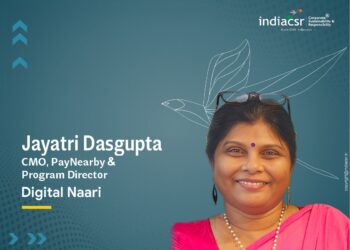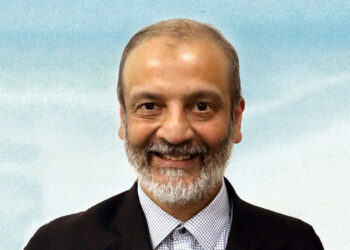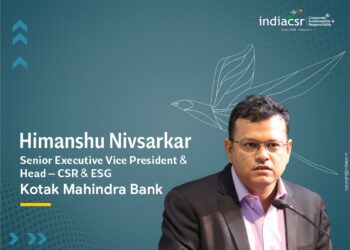At Diageo, each of our goals connect to different Sustainable Development Goals (SDGs). As we deliver on our targets through various programmes, we are ensuring that every activity we initiate contributes towards achieving that goal. We are focusing on the impact created by measuring this through our Social Impact Framework, said Navdeep Singh Mehram – Head, Sustainability, Diageo India, in an interview with India CSR Network. Edited excerpts:
How is sustainability a key element in the business of Diageo?
We look at ourselves not merely as a business entity focused on profitable growth but as global citizens committed to responsible and responsive actions for the larger good of society. By integrating social responsibility into our core business, we strive to create and deliver a positive contribution to the society by growing our brands’ relationships with consumers, strengthening our supply chain, supporting our productivity, and mitigating risk.
We believe, one of the best ways we can contribute to communities is by engaging others to become advocates for causes important to them and their stakeholders. Joining forces with Governments, NGOs, suppliers, local communities and our consumers means we can make an even greater contribution to socio-economic development around the world. Some of our strongest advocacy work involves campaigning for industry-wide standards to tackle alcohol misuse and promote responsible drinking. We are also passionate advocates in areas of women’s empowerment and water stewardship.
How can corporates and businesses integrate the achievement of The Sustainable Development Goals (SDGs) in their strategy? How is Diageo working towards the SDGs?
At Diageo, each of our goals connect to different SDGs. As we deliver on our targets through various programmes, we are ensuring that every activity we initiate contributes towards achieving that goal. We are focusing on the impact created by measuring this through our Social Impact Framework. Our work in the area of environment is helping to tackle climate change and support water resources (Goals 13 and 6). These achievements give us confidence in the contribution we are making to the SDGs. In helping deliver them, we are strengthening society for the future, enabling the communities where we work to thrive and therefore supporting our own future.
While various corporates have been contributing their bit towards SDGs, constructive, collaborative, and results-driven action across the industry is critically important to formulate, execute, and realize systemic change.

Do you think road safety should be an important part of CSR activities of corporates?
Absolutely! It is a matter of grave concern that India accounts for 12.5% of global road accidents. With over 145,000 fatalities a year, we have the dubious distinction of the highest road fatalities in the world. As per World Health Organisation report on Global road safety 2018, road accidents are a leading cause of deaths globally, claiming 1.35 million lives every year. The UN estimates that India suffers a loss of $58 billion annually due to accidents.
Over the last four years, through our flagship programme, ‘Road to Safety’, Diageo India is driving a national movement in bringing Road Safety into public discourse by bringing together road safety experts, Governments, educators and civil society to take cognizance of and address, critical aspects of road safety.
Can you highlight the structure of the road safety programme?
Road to Safety programme entails a holistic approach to road safety wherein we look at all the critical aspects. We simply call it a 4E strategy. The first one is Education – which deals with spreading awareness on road safety. The second important pillar of our programme is Enforcement which includes assisting the traffic police in enforcing traffic rules and training them on efficient ways to manage the traffic. The third ‘E’ is Emergency services – first aid treatment, quality emergency services, better emergency response mechanism etc. And lastly, better Engineering for safer roads. It mostly deals with infrastructure – better construction of roads with adequate spaces for all kinds of commuters, proper signages etc. These are the basic concepts which drive our Road Safety programme. Everything we do incorporates these four concerns and elements.

What are the means you have been using to reach out to the masses to spread awareness?
We partner with Government (centre and state), law enforcers, media, universities, NGO partners and citizens to spread the message of road safety. Together with the government and law enforcers we have organised capacity building trainings in road accident investigation and traffic management. Together with Ministry of Road Transport and Highway (MoRTH) and our NGO partner, the Institute of Road Traffic Education (IRTE), this programme has been implemented 64 cities and 18 states across the country.
With the media, we create high-visibility campaigns, both in metro cities and regional markets to create awareness amongst consumers on road safety. These consumer-outreach programmes have various engagement touchpoints to educate consumer and aims to reduce alcohol misuse in India. Lastly, recent our partnership with MoRTH and Universities we are educating millennials.
Our aim through these initiative is to bring about a collective consciousness on road safety and a definitive behavioural change in people towards road safety.
Please share your views on the impact you have been able to create through some of your initiatives?
The Diageo Road to Safety campaign currently in its 4th Year is slowly becoming a national movement owing to our varied partnerships. Till date, the programme has covered 19 states spread 67 cities training over 6,200 police officials, educating 6,000 commercial vehicle drivers and over 6,000 university students.
We also have a unique global partnership with the United Nations Institute for Training and Research (UNITAR) through which we run training in 15 countries across Africa, Asia, Latin and Central America, with a focus on countries with the highest death rates related to road traffic accidents.Theses training will reach approx., 6,000 people across 60 countries who are a mix of government officials, young people, and other relevant stakeholders.
What can be the steps taken, and what are the steps taken towards responsible drinking and curbing of drunk driving to support road safety globally?
Road traffic injuries are a serious public health problem and a leading cause of death and injury around the world each year. It is common knowledge that driving while under the influence of alcohol increases the risk of being involved in a crash – not only with other motorists but also with pedestrians. This is why the UN has named 2011-2020 as the ‘decade of action for road safety’ and set a target of halving road fatalities as part of the Sustainable Development Goals (SDGs).
Some countries have been more successful at reducing alcohol-related road injuries than others. Those that have been most successful have used a combination of awareness raising, consistent and high visibility enforcement of the legal BAC limit, strict penalties for drivers over the limit and tough enforcement of these penalties.

Diageo has been working to reduce alcohol-related fatalities and crashes and supports numerous drink drive prevention programmes around the world. These range from supporting high visibility enforcement through random breath tests in countries, to funding safe rides and free public transportation, and supporting laws to establish maximum blood alcohol concentration levels in countries where none exist.
The success of our programmes across the world and in India, goes to show the need to work alongside governments and other partners with programmes and policies that try to change behaviour and reduce harm.
How do you see the way forward for road safety in India?
I am optimistic that road safety will improve over the years. Already, we have seen greater awareness about Road Safety as compared to a few years ago. We are delighted to see positive policies and initiatives by the Ministry of Road Transport & Highways (MoRTH) and different state governments, leading corporates investing time, effort and money to address Road Safety.
As we move ahead, we require a concerted effort from all stakeholders to work towards implementing the “4Es” – Education, Enforcement, and Engineering and Emergency services. Partnerships and coordinated actions, big and small, will play a big role.
Disclaimer: The views expressed in this feature are entirely their own and does not necessarily reflect the views of India CSR Network and its Editor.
Terms & Conditions: India CSR Network does not permit other Websites/Agency to copy or reproduce or reprint the above article/feature in any form or means.

